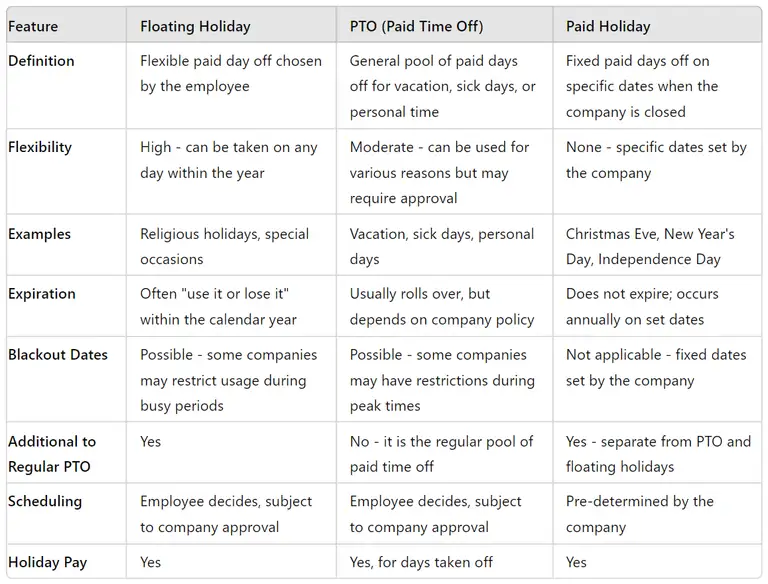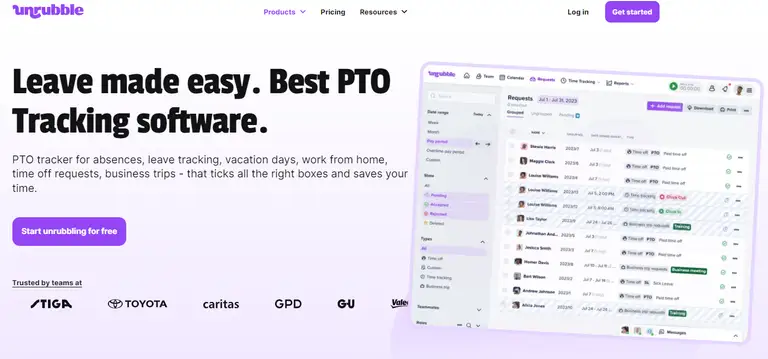Imagine an employee comes up and asks:
"Hi, I wanted to ask if our company offers floating holidays? I have a family event coming up next month, and it would be really helpful to have a flexible day off."
What do you say?
If this is your first time hearing about floating holidays, you've got some catching up to do.
What is a floating holiday?

A floating holiday is a flexible day off that employees can use when they need it the most. Unlike regular holidays, which are fixed on the calendar like Christmas Eve or New Year's Day, floating holidays let people choose their day off.
They're great for religious holidays that aren’t recognized by a company or if an employee wants to celebrate special occasions.
Essentially, floating holidays are bonus paid days that give workers the freedom to take time off when it suits them best.
Floating holiday vs PTO
PTO is a pool of days that can be used for vacation, sick days, or personal time. It’s a general bucket of paid time that employees can dip into as needed.
Floating holidays, however, are separate from PTO. They are specific days in addition to regular PTO.
This makes them perfect for those moments when an employee needs a break during busy periods or when a public holiday doesn't align with federal holidays.
While PTO can often be rolled over, unused floating holidays typically expire at the end of the calendar year, so it’s a “use it or lose it” deal.
Floating holiday vs paid holiday
Paid holidays are specific days off that people get because the company is closed, like on federal holidays. These are days like Christmas Eve or Independence Day when people get a paid day off automatically.
Floating holidays, on the other hand, aren’t tied to any specific date. People get to choose when to use them. That's particularly handy if they need a day off for something personal or to observe religious holidays not covered by the company’s holiday schedule.
Just watch out for blackout dates, which are times during the year when you can't use your floating holidays due to the company's busy periods.

Why offering floating holidays in your business is beneficial
It's a nice idea to add floating holidays to your company for the following reasons:
Flexibility
Giving employees floating holidays adds a lot of flexibility to their schedules. Instead of sticking to a rigid holiday calendar, they can choose days off that work best for them.
This means they can take time off when they need it the most, whether it's for personal reasons, family events, or just a break during a busy period. Flexibility lets everyone manage their work-life balance better, which can lead to happier and more productive employees.
Cultural inclusivity
Floating holidays are a great way to respect and celebrate the diverse backgrounds of your employees. Not everyone celebrates the same holidays, and that's okay.
With floating holidays, employees can take time off for their own religious or cultural celebrations that aren't covered by federal holidays. This approach shows that you value their traditions and are committed to creating an inclusive workplace.
Improved recruitment and retention
When potential hires see that your business offers floating holidays, it can be a big benefit. People want to work for companies that respect their time and give them the freedom to choose their days off.
This benefit can set you apart from other employers and attract top talent. Plus, it can boost retention because employees who feel respected and valued are more likely to stay with your company.
Better operational efficiency
This type of holidays can also improve your business's operational efficiency. By giving employees the choice to take time off when it suits them, you can avoid the mass absences that happen during major public holidays.
This keeps your operations running smoothly, even during peak times. You can plan better and maintain a steady workflow, which is good for both productivity and customer satisfaction.
Don't offer floating holidays if you're not ready for...
It's not all rainbows and butterflies though.
You should be aware of some of the shortcomings of offering floating holidays:
Administrative challenges
Managing floating holidays can get tricky. You’ll need a system to track who is taking time off and when, which can add to your administrative workload. It’s not as simple as marking fixed holidays on a calendar.
You’ll need to stay on top of requests and approvals, so there’s always enough coverage to keep things running smoothly. If your business isn’t prepared for this level of coordination, floating holidays might cause more headaches than they’re worth.
Could all this be avoided, though? The good news is... YES!
Managing floating holidays can be a daunting task, but Unrubble’s automated PTO Tracker makes it a piece of cake.

With Unrubble, you can track who is taking time off and when. Say goodbye to administrative headaches with our precision-driven time tracking, scheduling, and real-time timesheets.
Unrubble’s PTO Tracker centralizes all data, as well as avoids double bookings and human error. Our smart request management, multi-level approvals, and automatic notifications streamline the entire process, from submission to approval.
Start unrubbling for free today and change your leave management experience for the better.
Potential for misuse
There’s always a risk that some employees might misuse floating holidays. Without clear guidelines, people might take advantage of the flexibility.
You need to set up rules and communicate them clearly to prevent this. Employees should understand when and how they can use these days, and what the consequences are for not following the policy.
Inequity concerns
Floating holidays can sometimes lead to feelings of unfairness among employees. If some people get to use their days off for special occasions or personal reasons while others don’t, it might create resentment.
It’s vital to give everyone an equal opportunity to use their floating holidays. Clear communication and a fair policy can help, but you need to be ready to address any concerns that come up.
Impact on team dynamics
Teamwork might take a hit if floating holidays aren’t managed well. If key team members are frequently out on floating holidays, it can disrupt projects and affect productivity.
Coordination and planning become important. You’ll need to balance individual needs with the needs of the team to keep everything on track. If you’re not ready to handle these dynamics, floating holidays could end up causing more problems than they solve.
How to create floating holiday policy: step by step
1. Define the purpose and scope
First, you need to clearly define why you are implementing floating holidays and who will be eligible.
Is it to accommodate diverse religious holidays, special occasions, or just to give employees more flexibility?
Determine if the policy will apply to all employees or just certain groups.
2. Determine the allocation
Decide how many floating holidays each employee will receive.
Will it be a set number of days per year?
This number should be reasonable and fit within your overall time-off policy. Think about how these days fit into your budget and staffing needs.
3. Set usage guidelines
Create clear guidelines on how floating holidays can be used.
Specify if there are any blackout dates or busy periods when floating holidays cannot be taken.
Outline the process for requesting a floating holiday, including how far in advance requests should be made and who will approve them.
4. Address accrual and carryover
Decide if floating holidays will accrue over time or if they will be granted at the start of the year.
Also, determine if unused floating holidays can be carried over to the next year or if they are “use it or lose it.”
Most companies choose the latter to encourage employees to take their time off within the calendar year.
5. Define the policy on separation
Clarify what happens to unused floating holidays if an employee leaves the company.
Will they be paid out for unused days, or will these days be forfeited?
Make this part of the policy consistent with your other time-off policies.
6. Offer proper communication and training
Once your policy is in place, communicate it clearly to all employees.
Provide training to managers and HR staff so they understand how to implement and manage the policy.
Everyone has to know how to request floating holidays and what the rules are.
7. Monitor and review
Regularly monitor the use of floating holidays to see how the policy is working.
Get feedback from employees and managers about any issues or improvements that could be made.
Review the policy periodically and make adjustments as necessary.
Conclusion
Next time your employee or a job candidate asks you about floating holidays, you'll know how to answer.
Frequently asked questions
Will adding floating holidays to my company benefits improve employee satisfaction?
Yes, adding floating holidays can improve employee satisfaction by providing more flexibility and acknowledging diverse needs and cultures.
Are two floating holidays enough?
Two floating holidays can be enough for many employees, giving them flexibility for personal needs. However, the right number may depend on your company's size and employees' specific needs.
Is a floating holiday part of regular holiday pay?
Yes, a floating holiday is typically paid just like regular holidays. Employees receive their normal salary for the day off.
Can floating holidays be used for federal government holidays?
Yes, employees can choose to use floating holidays on federal government holidays if they prefer, depending on company policy.








